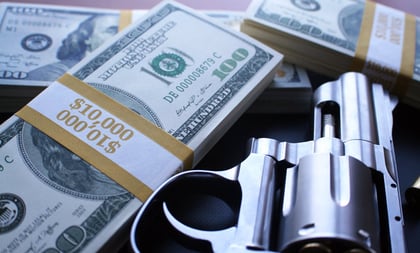When BlackRock, the world’s largest asset manager, announces it’s considering creating new index funds that exclude firearms manufacturers and retailers as it did on Friday, financial advisors should take note.
BlackRock is the world’s largest asset manager and it’s amping up its shareholder activism, which was already accelerating with CEO Larry Fink’s annual letter to CEOs stressing that companies “publicly articulate their strategic framework for long-term value creation” and affirm it has their board’s approval.
BlackRock already excludes gun-makers from all its actively managed funds and from its iShares MSCI KLD 400 Social ETF (DSI), the largest socially responsible index ETF, and it announced also on Friday that it’s engaging with gun-makers and gun retailers about the safe and responsible use of their gun products and sales.
“For manufacturers and retailers of civilian firearms, we believe that responsible policies and practices are critical to their long-term prospects. Now more so than ever,” said BlackRock in its Friday announcement.
And BlackRock is not alone. Vanguard, which excludes gun-makers from its FTSE Social Index Fund though not others, is also asking the boards and managements of gun manufacturers to disclose and mitigate the risks associated with gun violence. State Street says it will seek greater transparency from gun-makers on the same issue.
“State Street and Vanguard and BlackRock see themselves as peers, ramping up their efforts” on ESG issues,” says Jon Hale, head of sustainability research at Morningstar, adding that ESG factors — environmental, social and governance — ultimately indicate the sustainability of a company’s performance.
Despite these efforts, index investors, for the time being, “are left with having guns in their portfolios,” says Hale. So are investors in many actively managed funds.
Morningstar just published a report finding that among 264 small-cap mutual funds and ETFs, 75% to 95% owned one or more of the three leading gun-makers. Moreover, almost all small-cap index funds own at least one of the three gun-makers, including index funds from Vanguard and BlackRock’s iShares division. So do most total stock market index and extended market index funds, according to the report, written by Hale.
The percentage of fund assets in gun stocks, however, was small. Even the funds with the largest positions — all actively managed — usually had less than 2% of their assets invested in gun manufacturers.
But some funds held 5% or more of the outstanding shares of a particular gun-maker, including the Invesco Small Cap Value Fund, American Funds Growth Fund of America and First Eagle Global Fund.
For advisors who are asked by clients if their investments include any gun stocks, or who are interested in offering gun-free portfolios, these are the three primary gun producers whose stocks are publicly traded: Vista Outdoor (VSTO), Sturm Ruger (RGR) and American Outdoor Brands (AOBC), maker of Smith & Wesson firearms and the AR-15 used in the Parkland, Florida, high school shooting where 17 students and teachers died. All are small-cap stocks.









 March 05, 2018 at 10:59 AM
March 05, 2018 at 10:59 AM










